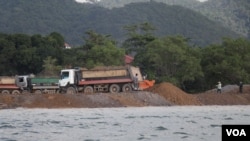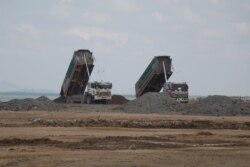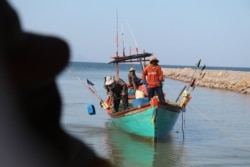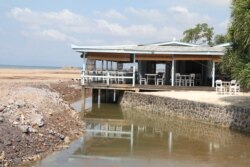The coastal reclamation occurring up and down Cambodia’s coast in tourist hot spots has arrived at Kep’s famous crab market.
Say Ra, who has been selling crabs, shrimp and octopus at Phsar Kdam for 20 years, is among the dozens of sellers and fishermen watching the trucks and excavators dump soil into the sea along 2.7 km of the coastline and wondering what it will mean for the iconic market, apart from certain change.
“I am concerned that I will no longer have a place for selling,” said Ra, the father of two, adding that he is worried that the authorities will build new shops for vendors and hike the rent. “I am afraid it is expensive to buy or rent when they build modern places.”
Tenants at the market say they were surprised when the machines moved in, as part of plans to reclaim 35 hectares of land for coastal development, essentially moving the shoreline up about 130 meters.
“I can’t say whether I am satisfied with the project or not. It is good to have development, but it also affects villagers,” said Ra.
“We lose nature, since there are infilling here,” he added. “If they [authority] decide to reclaim, it is their decision. We can’t oppose it.”
The massive project impacts the whole commercial ecosystem, which has remained relatively unchanged for decades, in the stalls and restaurants next to the big blue crab statue. The crabs kept in cages until they’re ready to cook die faster in the soil-strewn ocean, and the development will encroach on crab and fish hatcheries, locals say.
Provincial authorities said the development will build gardens, roads, and recreation sites. But during a visit to the area last month, residents told VOA Khmer they are worried about private beaches and private establishments replacing what is here now.
“I like nature more than others,” said Uot Sophea, 32, a fisherman and father of three in Kep province. “I don’t like this development, since it also affects many villagers.”
Tuy Chanthea, 38, a vendor at Phsar Kdam in Kep, said she is worried about being unable to sell like what she does due to coastal reclamation. She asked for low rent prices, as she now pays only half a dollar per day for her stall to sell cooked food like octopus, fish and shrimps.
“For my personal feeling, I don’t want the reclamation like that,” said Tuy Chanthea, 38, a mother of three and vendor at Phsar Kdam, worried about her sales dropping. “I want nature like before.”
The sub-contractor of Phsar Kdam declined to comment on development or estimate the number of vendors selling at the market.
Cambodia has a 450-km coastline stretching from Kep to Koh Kong provinces. Prime land on the Gulf of Thailand is among the latest flashpoints in the country’s tensions between public land and private property, and development versus conservation.
After backlash to what Prime Minister Hun Sen called illegal infilling along the coast in 2019, he declared that coastal land reclamation could only take place following environmental studies and when necessary, such as for building ports and breakwaters at resorts.
Kep provincial governor Som Piseth told VOA Khmer that the coastline expansion will be used for gardens and modern recreation sites for tourism, an industry he described as the “essential for the nation.”
“It is a thorough study for sustainable development and ensuring a sustainable environment,” he said, adding that vendors can still sell their goods along the coast.
The governor dismissed concerns about the privatization of the coast, saying: “We have a master plan of building gardens and public relaxation sites. Hard structures are allowed only on private land.”
Kong Pov, 49, who rents a kiosk near the market, has already felt the effects of the reclamation, with her stall now about 130 meters from the new coastline, which she said deters customers who might otherwise sit down and relax.
“Some days, I can’t even make a cent. The customers say they can’t come and sit and see such land filling,” she said.
“Some vendors have already left their places, since they can’t make profits,” Kong Pov said, noting that most vendors rent the places from the other owners.
“If they build gardens, I will be happy. But I am afraid I can’t sell here anymore,” she added.
The well-known Sailing Club Bar and Restaurant has also seen its traffic plummet after sand closed around its waterfront location. Ly Kosal, 29, a Sailing Club staffer, said the number of customers has decreased by 40% to 50%.
“I can’t say whether it is good or bad now. I’m waiting to see the visible development, and later I can evaluate,” he said.
“But I am now worried about losing my job if the owner reduces staff due to the decline of customers,” he added.







